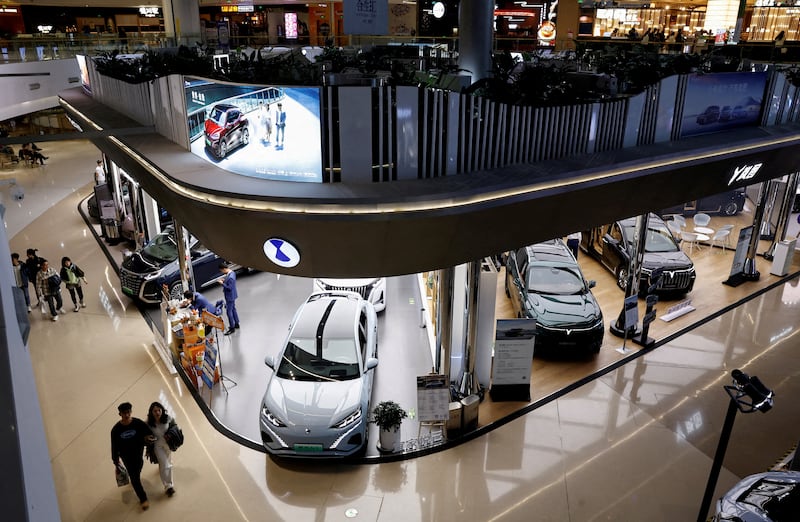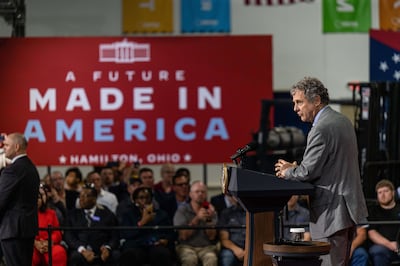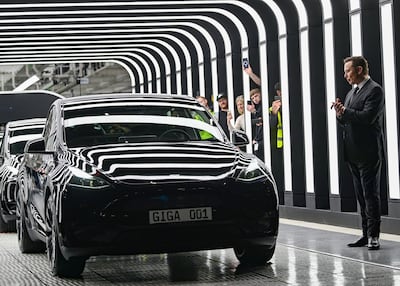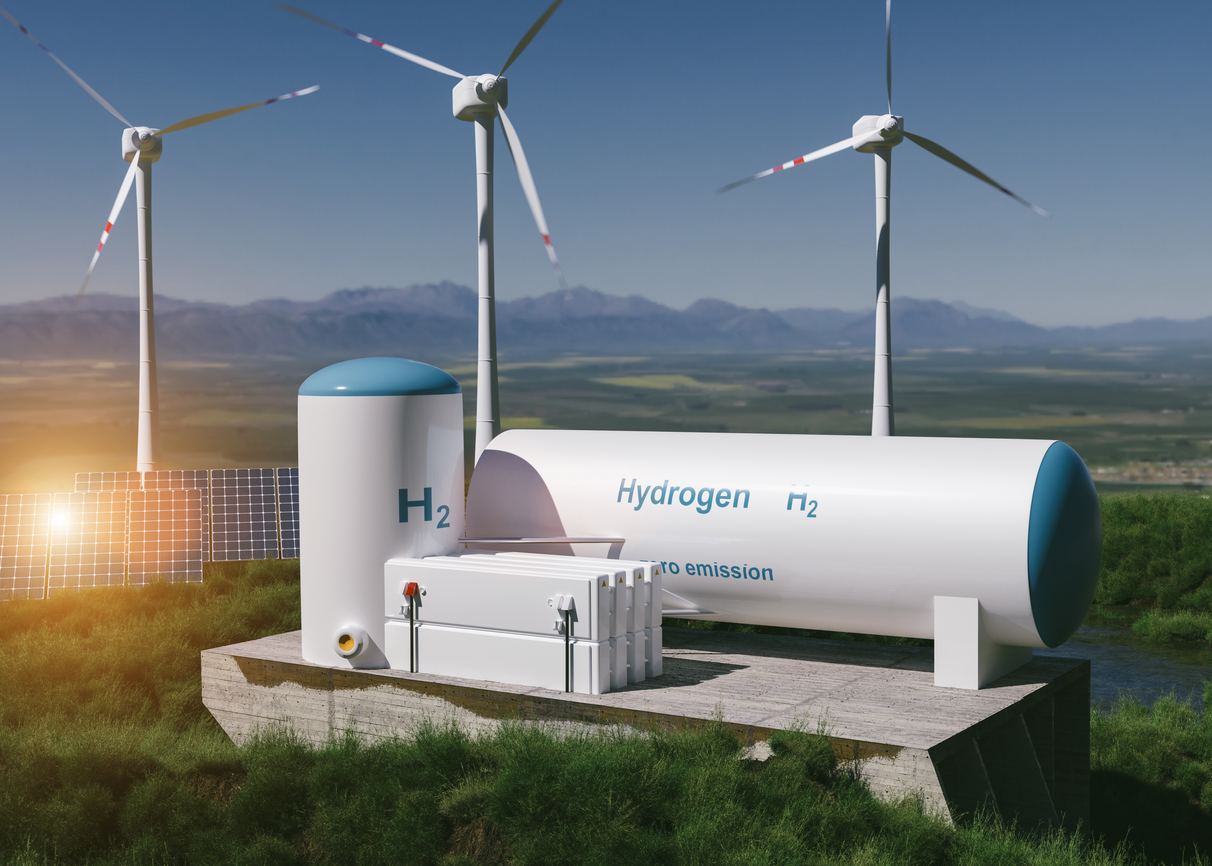The challenge in front of the US government is to distinguish security threats from lobbying efforts
OMAR AL-UBAYDLI
Omar Al-Ubaydli is director of economics and energy studies
at Derasat in Bahrain and a columnist for The Nation.

Electric vehicle models are on display at a shopping mall in Beijing.
China has overtaken the US in terms of global unit sales of EVs. Reuters
In response to China’s rapid ascent up the electrical vehicle manufacturing table, US Senator Sherrod Brown urged President Joe Biden to impose an outright ban on their import, citing national security concerns.
The challenge before Mr Biden and the American electorate will be to distinguish between genuine threats to the welfare of the citizens and the murky, self-serving lobbying that has typified US trade policy for much of the last century.
Chinese EV manufacturer BYD recently overtook Tesla as the world’s number one producer, while China has already overtaken the US in terms of global unit sales. This trend has been enough for American politicians to start ringing the alarm bell.
Taken at face value, they have two major concerns.
The first is that the ability to manufacture EVs is a strategically important one that must be guarded, especially if it is being threatened by “unfair” competition from China. The claim is that authorities in Beijing are covertly subsidising Chinese EVs as part of a national, predatory pricing strategy, with the ultimate goal of eliminating competitors and making China’s geostrategic adversaries dependent on its technology for EVs.
If that sounds far-fetched, then isomorphic claims were levelled at China in the domain of aluminum and steel, both of which constitute critical inputs into military manufacturing. The result was the stiff tariffs that former president Donald Trump imposed on both metals, and that his successor, Mr Biden, opted to maintain.

US Senator Sherrod Brown represents the state of Ohio,
which is a hub for the production of American EVs. AFP
Sherrod Brown is one of the two senators from Ohio, which happens to be a hub for the production of American EVs
The second concern voiced by American politicians is that Chinese electrical cars have cameras and other data-gathering devices that will boost Chinese espionage efforts. Information on critical infrastructure, military deployments and so on will flow in real time to the Chinese EV manufacturers from their units roaming the streets in the US, providing Beijing with a potentially dangerous advantage.
The proposed response to these national security concerns is easy: an outright ban on Chinese EVs.
China-bashing is one of the few remaining areas of bipartisan consensus in the US, and so there is plenty of support among elites for this proposition. Moreover, at the grassroots level, while voters do like saving money when buying cars, they can also be particularly jingoistic when it comes to vehicular purchases, so it is likely that many ordinary Americans would happily support such a ban.
In a macroscopic sense, the concerns raised are potentially valid: if China is engaging in predatory dumping, and if its cameras can gather sensitive information, then something needs to be done. However, there are two problems that Americans need to be wary of if they fear that Chinese EVs pose a threat to national security.
The first is ensuring consistency, by embedding their chosen policy – an outright ban or otherwise – in a broader national security strategy where all threats are evaluated accurately, and where the appropriate countermeasures are imposed in a proportionate manner.
So, for example, EVs are not the only Chinese goods that could potentially act as a hidden espionage device; so too could cellular phones, personal computers, televisions and other gadgets.
Ensuring consistency isn’t just about not looking silly in a debate; it is also about putting a framework that businesses and consumers regard as logical and predictable, so that they can adjust to it. If bans on Chinese goods are done in an arbitrary and erratic manner, then Americans will not know what to invest in or buy, and will instead make myopic decisions that harm the economy just to avoid being caught on the wrong side of a ban.

Chinese EV manufacturer BYD recently overtook Elon Musk's
Tesla as the world’s number one producer. AP
The second challenge is protecting ordinary Americans from predatory lobbying. The US political system has a long history of being perverted by canny lobbyists who know how to exploit loopholes to advance their agenda, even if it benefits a few at the expense of many.
One of the most salient examples is the absurd support that American sugar manufacturers have secured from the US government for many years, with the result being more expensive, lower-quality sugar for consumers, and American chocolate companies and others relocating to Canada in the pursuit of competitively priced sugar.
Mr Brown is one of the two senators from Ohio, which happens to be a hub for the production of American EVs. It could be that his pleas reflect an attempt at furthering the interests of American citizens from behind a veil of ignorance. Alternatively, these pleas could be an example of political patronage 101, whereby Mr Brown is trying to protect profits and jobs among his constituents by exaggerating the threat posed by Chinese EVs, even if the net effect of his favoured policies on Americans as a whole is negative.
The bank bailouts during the 2008 global financial crisis illustrate how shrewd insiders can manipulate the US political system in their favour while disregarding the collateral damage imposed upon the rest of society. The damage caused by each subversion is amplified by the motivation it gives to others to try their luck, too.
In the process, Congress transforms from being a forum for constructive policies that serve the voters into a negotiating chamber for narrow political favours.
Thus, to protect themselves, voters need to ask themselves: is Mr Brown being supported by colleagues from states that are outside the EV value chain? Is the call for a ban on Chinese EVs mirrored by calls for bans on other Chinese goods that pose a similar threat? Is there compelling evidence of covert subsidies by Beijing?
A brief glance through the history books should make Americans think long and hard before giving their politicians the benefit of the doubt.
Published: April 25, 2024
China's company to establish car assembly plant in Kyrgyzstan
Kyrgyzstan Materials 26 April 2024

BISHKEK, Kyrgyzstan, April 26. China's Kashgar Jiabo Technology company plans to launch automobile production in Kyrgyzstan's Naryn region, Trend reports.
According to the regional administration, investors held negotiations with the head of the region, Altynbek Ergeshov, and a tripartite memorandum was signed for the construction of a car assembly plant following the discussions. Altynbek Ergeshov, the CEO of Jiabo, Huang Yongqi, and the head of Kyrgyz Post, Marat Cherikchiev, were signatories to the document.
The plant's launch is expected to provide employment for 100 to 1000 local residents, producing vehicles powered by gasoline, gas, and electric cars. Suitable locations for construction are currently being considered, including options in Kochkor, Naryn, and At-Bashy.
The specific car models to be manufactured remain undisclosed. A special working group will be set up on this issue.
Meanwhile, earlier in April, Kyrgyzstan's President Sadyr Zhaparov signed a law, according to which green license plates will be issued for electric cars in the country.
Kazakhstan plans to create hydrogen locomotives
Economy Materials 25 April 2024

ASTANA, Kazakhstan, April 25. Kazakhstan plans to create hydrogen locomotives, Trend reports.
The corresponding plan is reflected in the Concept for the Development of Hydrogen Energy in Kazakhstan until 2040, which is currently under public discussion.
Thus, according to the plan, Kazakhstan will implement a pilot project to create hydrogen automobiles (primarily buses and trucks) and railway transport.
At the same time, in the future, this type of transport will be introduced in large cities in order to reduce environmental pollution.
Meanwhile, on September 17, 2023, CEO of Wabtec Rafael Santana informed the President of Kazakhstan about the investment projects being developed to launch the production of locomotives using hydrogen technologies and their components in Kazakhstan, the creation of an engineering center, and technology transfer.
Furthermore, Kazakhstan will receive 145 locally produced locomotives in 2024.
Thus, locomotive assembly plant Lokomotiv Kurastyru Zauyty (LKZ) will supply 101 locomotives in 2024, in particular 57 freight, 26 passenger, and 18 switcher diesel locomotives.
In addition, Electric Locomotive Kurastyru Zauyty LLP plans to supply 44 electric locomotives. In the first quarter, the plant delivered 9 electric locomotives on schedule.
Tags:
No comments:
Post a Comment